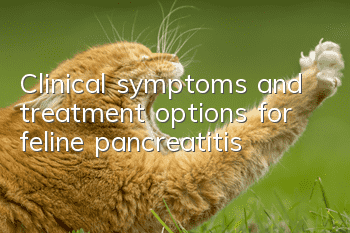Clinical symptoms and treatment options for feline pancreatitis

Pancreatitis, the invisible killer in cats, is uncertain when it will occur. It may be secondary or spontaneous. In short, as long as there are symptoms, they should be treated as soon as possible. So what are the symptoms of pancreatitis? And how to treat and prevent it? I hope the following will give you a better understanding of feline pancreatitis.
What is pancreatitis?
The pancreas is one of the important organs of cats. Pancreatitis is called pancreatitis. It is located near the stomach on the right side of the cat's abdomen. It produces enzymes that aid in food digestion and has hormonal functions that regulate insulin or blood sugar metabolism. When there are problems and inflammation of the pancreas, it is often accompanied by inflammation of the liver, intestines, or stomach. This is because the inflammation associated with acute pancreatitis causes digestive enzymes to spill into the abdominal cavity and cause infection. The disease does not distinguish between the age, gender and breed of cats.
Clinical symptoms of pancreatitis.
The most common clinical symptoms include nausea and vomiting (which is located near the stomach and duodenum). When the pancreas becomes inflamed, it can cause vomiting because the stomach and upper intestines are also inflamed. )Fever, lethargy, abdominal pain, diarrhea and loss of appetite. If the attack is severe, it may result in acute shock or death (severe pancreatitis can cause difficulty breathing). If the pancreas is severely inflamed, the bile ducts may become blocked, causing bile to reflux. As a result of this blockage, your cat's skin, eyes, and mucous membranes may be yellow. Cat Pancreatitis Symptoms (How to Treat Cat Pancreatitis Symptoms)
What is the cause of pancreatitis?
In cats, pancreatitis may occur spontaneously without any identified trigger or cause.
Pancreatitis may also be secondary to enteritis or cholangiohepatitis.
How to diagnose pancreatitis.
Check the blood. Diagnosis can be made if trypsin is elevated in the blood and symptoms of pancreatitis appear. The Feline Trypsin-Like Immune Reaction Test measures elevated concentrations of trypsin-like protein in the blood and can also diagnose pancreatitis. X-rays show inflammation of the pancreas or surrounding areas and may indicate pancreatitis based on symptoms. X-ray imaging can also detect if there is damage to the pancreas. An ultrasound can help diagnose whether swelling or thickening of the pancreas or surrounding area is inflammatory. Cat Pancreatitis Symptoms (How to Treat Cat Pancreatitis Symptoms)
How to treat pancreatitis.
Feline pancreatitis is divided into two categories: acute or chronic, mild or severe.
Chronic early pancreatitis can be treated with medications, usually intravenous and oral medications. Generally, anti-inflammatories, analgesics, and antibiotics are used to minimize the risk of pancreatic suppuration (infection) and to help cats with pain relief. Sometimes, some medications to treat vomiting are used based on symptoms. If you have severe hemorrhagic pancreatitis or your cat shows signs of shock, you will need to use high doses of intravenous fluids and medications to counteract the shock.
Most cats recover without any long-term consequences. However, severe or recurrent pancreatitis may cause one or more of the following problems:
If the cells that produce large amounts of digestive enzymes are destroyed, a lack of proper food digestion may result. This is called exocrine pancreatic dysfunction and can be treated by taking enzyme tablets or powder with food every day. If large numbers of insulin-producing cells are destroyed, diabetes can result. Insulin is usually injected once a day. If chronic pancreatitis occurs, it may recur. These cats may have a loss of appetite, fever, and lethargy for several days. In some cases, it may eventually develop into diabetes and we must follow the doctor's treatment plan.
Clinical symptoms and treatment options for feline pancreatitis
If diagnosed early, the disease can be treated without causing permanent damage to the pancreas or other organs. With appropriate treatment, mild pancreatitis usually has a good prognosis, and most cats recover without recurrence. After returning home, if the cat does not vomit, you can feed it less at this time to see if there is any reaction. If there are no adverse reactions, you can gradually increase the amount of food. Ensure normal nutrient supply and prepare enough clean and warm water (cats like to drink running water).
Do not give dry food, which will increase the burden on the digestive system. Feed your cat canned wet food (the ingredients are optimistic). Chicken and ham are the best ingredients because these proteins are more nutritious and easier to digest than canned wet food proteins from other ingredients. A low-fat diet is better and safer for cats and can reduce the burden on the stomach. During the recovery process, it is very important to provide key calories and nutrients. Of course, your veterinarian will also prescribe some oral medications during the recovery period, such as anti-inflammatory and anti-vomiting medications. They should be taken on time as recommended by their doctor. Cat Pancreatitis Symptoms (How to Treat Cat Pancreatitis Symptoms)
Prevention
In fact, the best way to treat this disease is prevention. For example, cats with pancreatitis usually pay attention to their diet and do not suddenly change their food. Rich, high-fat foods are the main cause of pancreatitis. Cats should eat a low-fat diet to aid digestion. Of course, other diseases may also cause pancreatitis, so if you have any problems, you should see a doctor promptly, do not delay the condition, and strive to treat the disease at the best possible time.
Conclusion: Pancreatitis may cause serious consequences and even be life-threatening. Although the cause of pancreatitis is unknown, we can tell simply by looking at your cat’s physical signs. The earlier it is detected and treated, the better. In most cases, cats can recover from pancreatitis with early recognition and treatmentcomplex.
- What age should a Himalayan cat be neutered?
- Can cats be kept in cages?
- How long does it take for a cat to be fed and watered after being neutered?
- What are the disadvantages of being overweight in cats? (How to prevent cats from becoming obese?)
- How long does it take for a female cat to recover after neutering surgery?
- Can cats eat spicy food? Can cats eat spicy food?
- Why is Chartres cat falsely pregnant?
- Why does the ragged cat not have enough milk?
- What to do if a male cat’s wound becomes infected after sterilization
- Can I have a hairless cat while pregnant?



